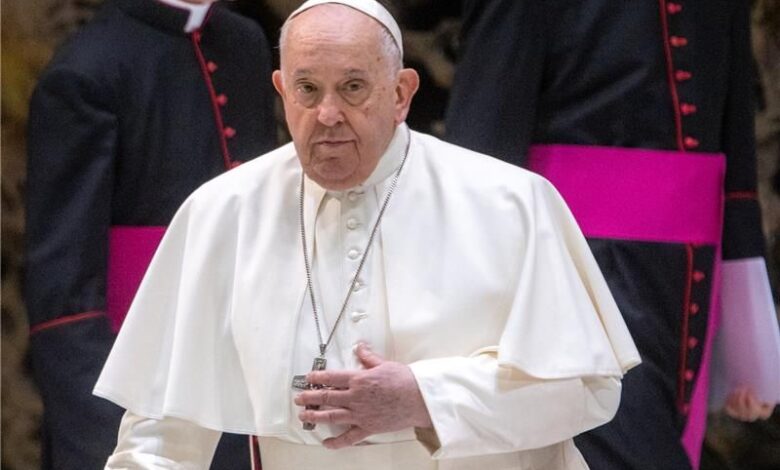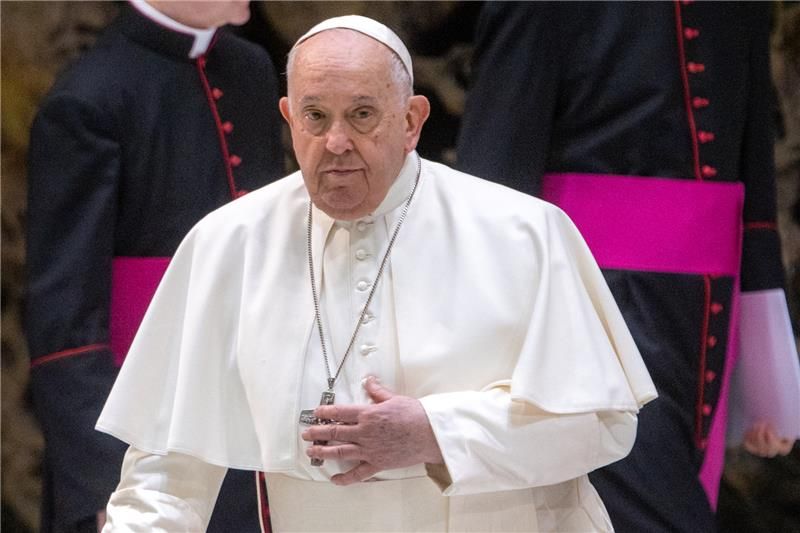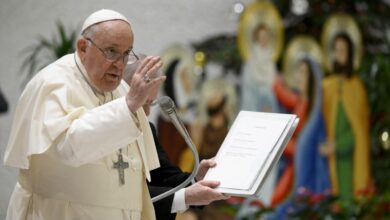Pope Francis calls for global regulation of AI for ‘peace and common good’

 Pope Francis at the General Audience at the Vatican on Dec. 6, 2023. / Credit: Daniel Ibáñez/EWTN News
Pope Francis at the General Audience at the Vatican on Dec. 6, 2023. / Credit: Daniel Ibáñez/EWTN News Washington, D.C. Newsroom, Dec 14, 2023 / 14:20 pm (CNA).
Pope Francis on Thursday urged global leaders to adopt an international treaty to regulate the development and use of artificial intelligence, saying technological research must be directed toward “the pursuit of peace and the common good.”
In his message, titled “Artificial Intelligence and Peace,” the pope warned of numerous risks associated with artificial intelligence development. He emphasized that technological innovations are not neutral “but subject to cultural influences” and that caution must be exercised to prevent “falling into the spiral of a ‘technological dictatorship.’”
“I hope that the foregoing reflection will encourage efforts to ensure that progress in developing forms of artificial intelligence will ultimately serve the cause of human fraternity and peace,” the pontiff said in his message, which was prepared for the 57th World Day of Peace Conference, celebrated Jan. 1, 2024.
“It is not the responsibility of a few but of the entire human family,” Francis continued. “For peace is the fruit of relationships that recognize and welcome others in their inalienable dignity, and of cooperation and commitment in seeking the integral development of all individuals and peoples.”
The pope said that although “‘intelligent’ machines may perform the tasks assigned to them with ever greater efficiency,” artificial intelligence is “merely ‘fragmentary’ in the sense that they can only imitate or reproduce certain functions of human intelligence.”
He added the impact of such developments is heavily affected by “the aims and interests of its owners and developers” and that algorithms can replicate “the injustices and prejudices of the environments where they originate” and cannot be the standard for moral judgment.
“The unique human capacity for moral judgment and ethical decision-making is more than a complex collection of algorithms, and that capacity cannot be reduced to programming a machine, which as ‘intelligent’ as it may be, remains a machine,” Francis said.
One of the pope’s main concerns with artificial intelligence is its potential use in war through autonomous weapons. Such weapons, he warned, “can never be morally responsible subjects” and could also end up “in the wrong hands” and be used to facilitate “terrorist attacks” or the destabilization of “legitimate systems of government.”
Also of concern, he noted, is the potential use of artificial intelligence in determining mortgage applications, job hiring, the possibility of recidivism of a person in prison, and the right to receive political asylum or social assistance. He warned that such algorithms can be “exposed to forms of bias and discrimination” and that “systemic errors can easily multiply.” He also said the technology could lead to more automation of labor jobs.
“Reliance on automatic processes that categorize individuals, for instance, by the pervasive use of surveillance or the adoption of social credit systems, could likewise have profound repercussions on the social fabric by establishing a ranking among citizens,” Francis said.
The pope’s comments were not entirely negative. Rather, he said artificial intelligence could be used for the good of humanity “if we show ourselves capable of acting responsibly and respect such fundamental human values as ‘inclusion, transparency, security, equity, privacy, and reliability.’”
“If artificial intelligence were used to promote integral human development, it could introduce important innovations in agriculture, education, and culture, an improved level of life for entire nations and peoples, and the growth of human fraternity and social friendship,” the pontiff noted. “In the end, the way we use it to include the least of our brothers and sisters, the vulnerable and those most in need, will be the true measure of our humanity.”
Francis argued that governments and international organizations can “play a decisive role” in establishing agreements that ensure the development and use of artificial intelligence takes these concerns into account. He suggested “a binding international treaty” that regulates the technology.
“The goal of regulation, naturally, should not only be the prevention of harmful practices but also the encouragement of best practices, by stimulating new and creative approaches and encouraging individual or group initiatives,” the pope said.
Such regulations, Francis added, “can hardly prescind from the consideration of deeper issues regarding the meaning of human existence, the protection of fundamental human rights and the pursuit of justice and peace.” He said the regulators should listen to all stakeholders, “including the poor, the powerless, and others who often go unheard in global decision-making processes.”
“It is my prayer at the start of the new year that the rapid development of forms of artificial intelligence will not increase cases of inequality and injustice all too present in today’s world but will help put an end to wars and conflicts, and alleviate many forms of suffering that afflict our human family,” the pontiff said.
In a Vatican news conference following the release of the pope’s letter, Cardinal Michael Czerny, the prefect of the Dicastery for Promoting Integral Human Development, said that “artificial intelligence is acceptable if it serves the common good, protects the inalienable value of the human person, and promotes fundamental rights.” He warned against likening technological progress to a neutral tool, like a hammer.
“Whether a hammer contributes to good or evil depends on the intentions of the user, not those of the hammer maker,” Czerny said, ”whereas [artificial intelligence]-based digital technologies build in individual and social values of their owners and makers [and] … reflect the values of their users.”


